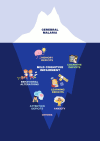Exploring the hidden mental health consequences of malaria beyond the fever
- PMID: 39091401
- PMCID: PMC11291252
- DOI: 10.3389/fnhum.2024.1432441
Exploring the hidden mental health consequences of malaria beyond the fever
Abstract
Malaria morbidity has various presentations and the focus now shifts to uncommon signs and symptoms of malaria infection such as cognitive impairment to address the morbidity when the mortality declines. About 50% of children admitted to hospitals due to malaria experience neurological complications due to factors like low blood sugar, inflammation, elevated pressure, decreased oxygen levels, and excitotoxicity. Malaria during pregnancy negatively also impacts children's cognitive, behavioral, and executive function leading to neurodevelopmental delay due to increased susceptibility which can significantly affect maternal and child health, leading to higher rates of underestimated factors like anxiety, depression, and PTSD. Despite having the world's second-largest tribal population, India's indigenous and tribal communities and their mental health are less explored and less understood. Western psychological tools and neurocognitive assessment tools are not universally applicable, thus necessitating the development of tailored tools to investigate psychological or neurocognitive impairment. This paper has illuminated the hidden mental health consequences of malaria infection, emphasizing the prevalence, nature, and implications of psychological distress among affected individuals. The findings underscore the importance of recognizing and addressing these psychological consequences in the holistic management and prevention of malaria and its mental health consequences.
Keywords: cerebral malaria; cognitive impairment; malaria; malaria morbidity; mental health; neurocognition; neurological impairment.
Copyright © 2024 Nandish, B. M., N., Shankar, Tripathi, Kashyap, Jain, Anvikar and Chalageri.
Conflict of interest statement
The authors declare that the research was conducted in the absence of any commercial or financial relationships that could be construed as a potential conflict of interest.
Figures

References
Publication types
LinkOut - more resources
Full Text Sources

